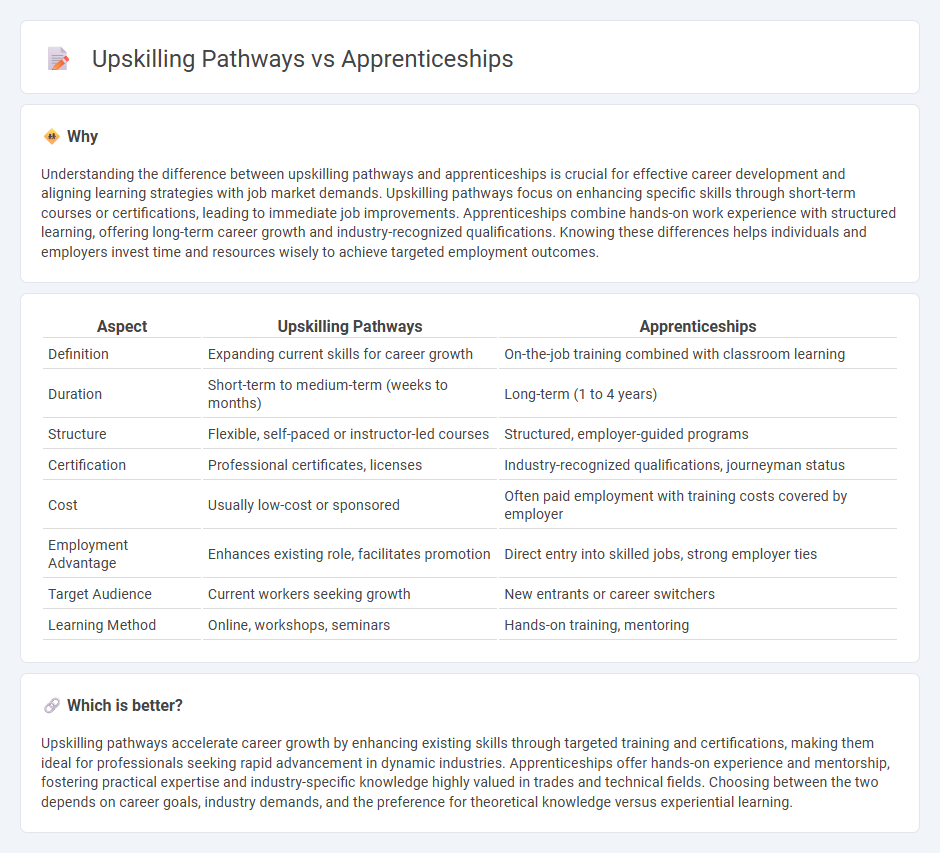
Upskilling pathways focus on enhancing existing skills or acquiring new competencies through targeted training programs, workshops, and online courses to meet evolving job market demands. Apprenticeships combine on-the-job training with classroom instruction, allowing individuals to gain practical experience while earning credentials in specific trades or professions. Explore the key differences and benefits of upskilling pathways versus apprenticeships to determine the best route for your career advancement.
Why it is important
Understanding the difference between upskilling pathways and apprenticeships is crucial for effective career development and aligning learning strategies with job market demands. Upskilling pathways focus on enhancing specific skills through short-term courses or certifications, leading to immediate job improvements. Apprenticeships combine hands-on work experience with structured learning, offering long-term career growth and industry-recognized qualifications. Knowing these differences helps individuals and employers invest time and resources wisely to achieve targeted employment outcomes.
Comparison Table
| Aspect | Upskilling Pathways | Apprenticeships |
|---|---|---|
| Definition | Expanding current skills for career growth | On-the-job training combined with classroom learning |
| Duration | Short-term to medium-term (weeks to months) | Long-term (1 to 4 years) |
| Structure | Flexible, self-paced or instructor-led courses | Structured, employer-guided programs |
| Certification | Professional certificates, licenses | Industry-recognized qualifications, journeyman status |
| Cost | Usually low-cost or sponsored | Often paid employment with training costs covered by employer |
| Employment Advantage | Enhances existing role, facilitates promotion | Direct entry into skilled jobs, strong employer ties |
| Target Audience | Current workers seeking growth | New entrants or career switchers |
| Learning Method | Online, workshops, seminars | Hands-on training, mentoring |
Which is better?
Upskilling pathways accelerate career growth by enhancing existing skills through targeted training and certifications, making them ideal for professionals seeking rapid advancement in dynamic industries. Apprenticeships offer hands-on experience and mentorship, fostering practical expertise and industry-specific knowledge highly valued in trades and technical fields. Choosing between the two depends on career goals, industry demands, and the preference for theoretical knowledge versus experiential learning.
Connection
Upskilling pathways and apprenticeships are interconnected as both focus on enhancing workforce skills through practical, hands-on learning experiences that meet industry standards. Apprenticeships serve as structured employment opportunities that enable individuals to gain specialized skills while earning, aligning directly with upskilling goals for career advancement. Companies benefit from this connection by cultivating a highly skilled talent pool that drives productivity and innovation.
Key Terms
On-the-job training
On-the-job training is a core component of apprenticeship programs, offering practical, hands-on experience that integrates learning with actual work responsibilities. Upskilling pathways often include on-the-job training but may also leverage short-term courses or workshops to quickly enhance specific skills without full immersion. Explore detailed comparisons to understand which approach best suits your career development needs.
Skill certification
Apprenticeships provide hands-on experience combined with formal education, leading to industry-recognized skill certification that enhances employability in trades and technical fields. Upskilling pathways, often achieved through targeted training programs or online courses, focus on updating existing skills and earning certifications that validate expertise in emerging technologies and professional specialties. Explore the benefits of each approach to determine the most effective skill certification strategy for your career advancement.
Career progression
Apprenticeships provide hands-on experience and industry-recognized qualifications, accelerating career progression through practical skill acquisition and professional networking. Upskilling pathways enhance existing competencies with targeted training, enabling employees to adapt to evolving roles and advance within their current organization. Explore how each pathway can strategically support your career growth and future opportunities.
Source and External Links
Apprentice Florida - Apprenticeships offer on-the-job paid training combined with technical instruction, helping job seekers earn while they learn, with average completion salaries around $60,000 and applicability in over 1,200 occupations across many industries including IT and healthcare.
Career Seekers - Apprenticeship.gov - Registered Apprenticeship is a paid, employer-driven career path combining work experience with classroom training, offering nationally recognized credentials and wage increases as skills develop.
Apprenticeships - CareerSource NEFL - Apprenticeships in Florida span many industries and provide earn-while-you-learn opportunities with mentorship, wage progression, and national certification for job seekers looking for alternatives to four-year degrees.
 dowidth.com
dowidth.com